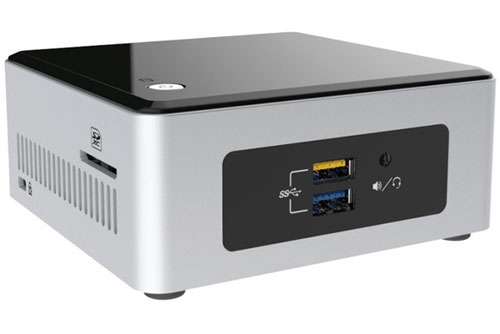Intel’s new low-end NUC PC kits are now available for pre-order, bringing the cost of a mini bare-bones PC down to just $129.
NUC (short for Next Unit of Computing) is Intel’s brand of small, build-your-own PC kits, which have been around for about two years now. The kits include a motherboard, processor, power supply, and all kinds of input/output ports; users supply their own storage, RAM, operating system, monitor and input devices.
While the original NUC kits cost more than $300, the latest models are much cheaper thanks to Intel’s Braswell processors. Not to be confused with the Broadwell chips found in most Ultrabook laptops, Braswell is more akin to what you’d find in a tablet or netbook, though as Ars Technica notes, it runs at a higher TDP to allow for sustained higher speeds—perfect for a desktop PC that’s not drawing battery power.
The new NUCs beg for home theater use, with support for 4K video streaming and TOSLINK optical audio output. Other specs include VGA and HDMI outputs, an SDXC card slot, four USB 3.0 ports (including a charging port that works when the PC’s power is off), an ethernet port, a headphone jack, and 802.11ac Wi-Fi. These aren’t fanless designs, though they should run quieter than a typical desktop.
Right now, Amazon has two models up for pre-order. The $129 NUC5CPYH has a dual-core Celeron N3050 processor and ships in two to four weeks, while the $172 NUC5PPYH has a quad-core Pentium N3700 processor and ships in a month or two. Either way, factor in at least a couple hundred bucks more for Windows, storage, and RAM.
Why this matters: The size of Intel’s NUCs have always looked like they’d fit in a living room, but hadn’t quite nailed the balance between power and price. These new models look more promising, especially with 4K video support, and tout the cheapest entry cost we’ve seen yet.
Source: www.pcworld.com

